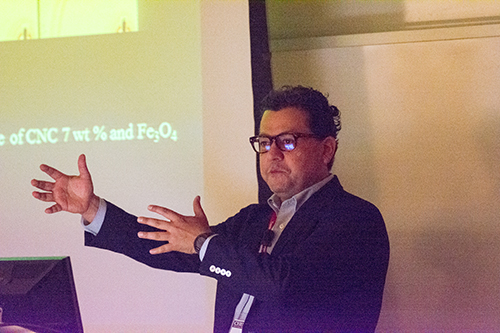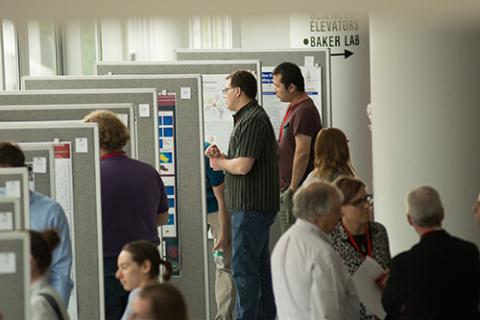As in past years, the user community heard updates on status, vision and new capabilities by CHESS Director Joel Brock and Associate Director Ernie Fontes, followed by Marian Szebenyi speaking for MacCHESS and Matthew Miller for the InSitμ program. Accelerator physicist James Shanks talked about successful conclusions to upgrade projects he mentioned last year towards reducing x-ray beam sizes at the undulator sources, reducing injection times, and increasing currents in the storage ring.
In keeping with the theme, though, the big news was hearing that CHESS is drawing up plans to reconfigure the accelerator and beamlines to use only a single source of particles. This will involve relocating the five experimental stations currently fed on the A, B, C, and D beamlines. With a single particle beam in the machine, Shanks showed how x-ray source sizes will be reduced and experimental stations will all have independently-tunable undulators. Today's bend-magnet stations will see intensity gains over a factor of 1000. Fontes showed a conceptual plan for six new experimental stations, an extension of the three existing F-line stations, and discussed how new beamlines will not be simply a relocation of equipment and capabilities from old beamlines.
Echoing an earlier message from Brock's introduction, definition and design of the new beamlines will follow, identifying the most pressing and important scientific needs for a future CHESS - the exact reason the six science workshops are being held through June. In the second session of the day, Director Brock presented a long-term vision for CHESS as a high intensity, high-energy x-ray source with unique capabilities and special types of organization and user support. Users really enjoyed hearing from Dr. Linda Sapochak, the Deputy Director of the Division of Materials Research at the National Science Foundation (and for the past year the divisions' acting director) who spoke to the Foundation's mission, funding, and process seeking "Big Ideas" for future science that will be most impactful and relevant to society. We expect that the energy and enthusiasm of her presentation will keep CHESS and the user community buzzing about "big ideas" throughout this month’s workshops and beyond.
Users enjoyed hearing presentations from student paper prize winner Geoffrey Purdum, from the Loo group at Princeton, as well as from Neil Banerjee (Univ. of Western Ontario), Erik Muller (SUNY Stony Brook), Moutse Ranaivoson (Univ. of Medicine & Dentistry of New Jersey), Sin Urban (Johns Hopkins University), and Randall Headrick (Univ. of Vermont). The afternoon poster session showed a record 51 posters to an enthusiastic mulling crowd. CHESS awards two poster prizes for categories of best technology and best science. Advanced Design Consulting Inc. sponsored the award for the best technology poster, which went to graduate student Prafull Purohit and his collaborators Mark W. Tate, Kayla X. Nguyen, Darol Chamberlain, David A. Muller, and Sol. M. Gruner for their poster "High-Speed, High Dynamic Range Pixel Array Detector for Scanning Transmission Electron Microscopy." Xelera Research sponsored the prize for the best science poster, which went to graduate student Jessica M. Stromberg and her collaborators Lisa L. VanLoon, Neil R. Banerjee, and Erik Barr for their poster "Mine to Micron Characterization of Gold and Arsenic in the Dome Mine Ankerite Veins: Synchrotron X-ray Spectroscopy of Whole Rock Samples."

The second day of the meeting is usually reserved for topical workshops. This year we used June 8th to launch three of six science workshops that will help shape a science case for the renewal of CHESS coming up in 2019. Next month's newsletter will report on these exciting workshops, and a more detailed report will be forthcoming in a Fall edition of Synchrotron Radiation News. All are invited to attend in person or remotely via YouTube Live (http://meetings.chess.cornell.edu/sciworkshops2016/index.html).
The business side of the meeting saw the user community nominate and elect two new representatives to the Users' Executive Committee. Congratulations to new members Steven Meisburger (Princeton) and John Twilley (SUNY Stony Brook). In addition to helping organize the meeting by members of the Users' Executive Committee, chaired by Prof. Meredith Silberstein (Cornell), local organizers Kathy Dedrick and Ernie Fontes were especially grateful for the professional assistance of Barbara Herrman, Megan Falso, Frances Fronda, Rick Ryan, and a big IT effort organized by Shijie Yang. Many staff members at CHESS showed their best team effort to make the event a great success.
